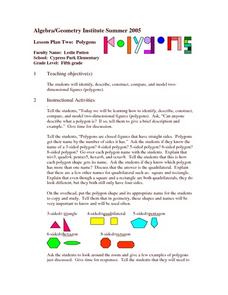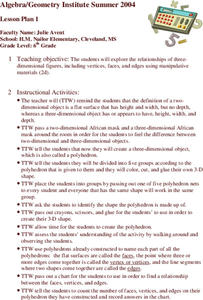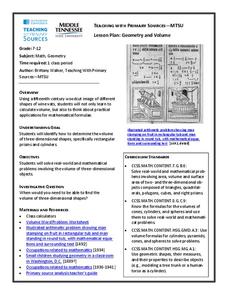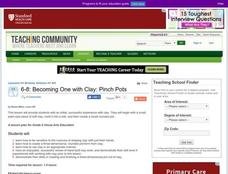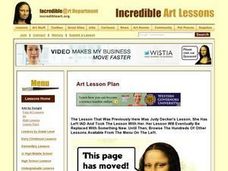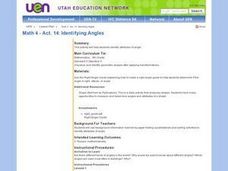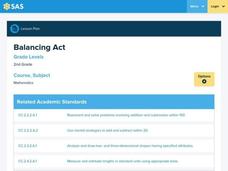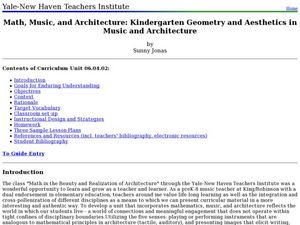Curated OER
Intersecting Lines and Vertical Angles
Pupils identify and define intersecting lines and vertical angles. They draw two intersecting lines and measure one pair of vertical angles. Learners will also move a line to change the angles of a figure and describe the changes in the...
Curated OER
Conics in Geometry
High schoolers analyze characteristics and properties of two and three-dimensional shapes in this geometry lesson. They follow detailed directions to use the Cabri Geometry II Application on their TI-89 calculator to construct a...
Curated OER
Sort it Out
Students identify and sort a variety of two- and three-dimensional objects and compare and contrast their attributes. They identify shapes, locate shapes on the faces of solids, sort real objects and explain the sorting rule, and...
Curated OER
Opening A Cube
Fifth graders investigate mathematical concepts related to the construction of a three dimensional cube. They construct the cube from two dimensional patterns and compute the surface area. Students also define the faces, edges, and...
Curated OER
Landscape Book
Students create a three-dimensional book about landscapes. They must show their understanding of shape, color and balance.
Curated OER
Lesson Plan Two: Polygons
Learners explore the concept of polygons on a two-dimensional plane. They identify polygons in everyday life and draw different polygons according to their classification. Using a geoboard and geobands, they consrtuct polygons and even...
Curated OER
Three-Dimensional Figures
Sixth graders explore three-dimensional objects. In groups, they create and decorate their own polyhedron design. After identifying the faces, vertices, and edges of the polyhedron, 6th graders determine a relationship between the...
Virginia Department of Education
Geometry and Volume
The history of math is fascinating! Utilize a woodcut primary source image from 1492 and posters from the 1930s to help geometers apply their volume-calculation skills to real-life questions.
Curated OER
Becoming One With Clay: Pinch Pots
Explore the making of a pinch pot using this resource. Learners discuss the properties of clay, including its molecular structure. Then, they make their own clay pot. As they work, they identify the techniques used to make a pinch pot,...
Curated OER
Halves and Fourths
Young mathematicians may not love fractions, but do they love sandwiches? How about cake? Use this visual fractions activity to represent fractions in a relatable way. Scholars start by coloring segmented shapes to indicate halves and...
Curated OER
Paper Maché Mancala Game Boards
Seventh graders create three dimensional works of art from two dimensional plans, develop skills in papier-mach?? technique, utilize elements and principles of design to create 3-D form, and develop math/strategy skills in playing the...
Alabama Learning Exchange
Dog Gone Again!
Here is a real-life lesson plan! Learners must plan the dimensions of a rectangular fence to reign in a runaway dog. They survey what shape and size fence is needed and use formulas to find perimeter and area of the fence. They explore...
Curated OER
Tomato Exploration
Create tomatoes in 15-20 minutes using this fun and interactive lesson plan! Learners listen to a book about tomatoes (recommendations listed), and focus on the vocabulary word tomato. They count the syllables and practice the plural....
Curated OER
Papier-Mâché Globe
Paper mache projects are great for using up paper from the recycle bin. Give your class the chance to create a three-dimensional globe out of paper mache. They'll work to make their globes as accurate as possible, adding proper colors...
Curated OER
Identifying Angles
Fourth graders discuss and examine examples of the different types of angles. After learning the names of the geometric shapes students identify the types of angles and then complete the Kidspiration activity, Identifying Angles.
Curated OER
Balancing Act
Second graders identify the attributes of various shapes and estimate the weight of the objects. In this geometry lesson, 2nd graders identify the attributes of concrete objects and use a pan balance to weight them.
Curated OER
Surface Area and Measuring
Tenth graders explore volume and surface area through percentages. In this geometry lesson, 10th graders analyze the surface area of two and three dimensional shapes, then use percents and ratio to compare the two.
Curated OER
Math, Music and Architecture: Kindergarten Geometry and Aesthetics in Music and Architecture
Students identify and name different geometrical shapes. In this math lesson plan, students distinguish odd from even numbers. They describe the properties of 2 and 3 dimensional objects.
Curated OER
Super Shapes Part 2 - Circles
Through the use of Internet, video, and hands-on activities, youngsters learn the parts and characteristics of a circle. This fantastic lesson has some excellent website activities included in the plan. Your kids will have a much greater...
Curated OER
Geo Jammin'
Pupils compare and contrast related two- and three-dimensional shapes, and complete a Venn diagram illustrating the attributes of each. Using a poem pattern from another instructional activity, students use data from the diagram to write...
Curated OER
Shape Walk
Learners take a field trip to a local park or beach to collect objects. They practice counting the objects and put them into categories according to type of shape like a cone, cylinder, etc... As an extension to the lesson students could...
Curated OER
Shape City
Students add to a class Shape City by designing and constructing new buildings.
Curated OER
Math - "Solid Shapes" - Comparing 3-D Objects
In this geometry worksheet, students learn about 3-D objects and how to describe them. They then answer 10 questions using the information they learned. The answers are on the last page.







